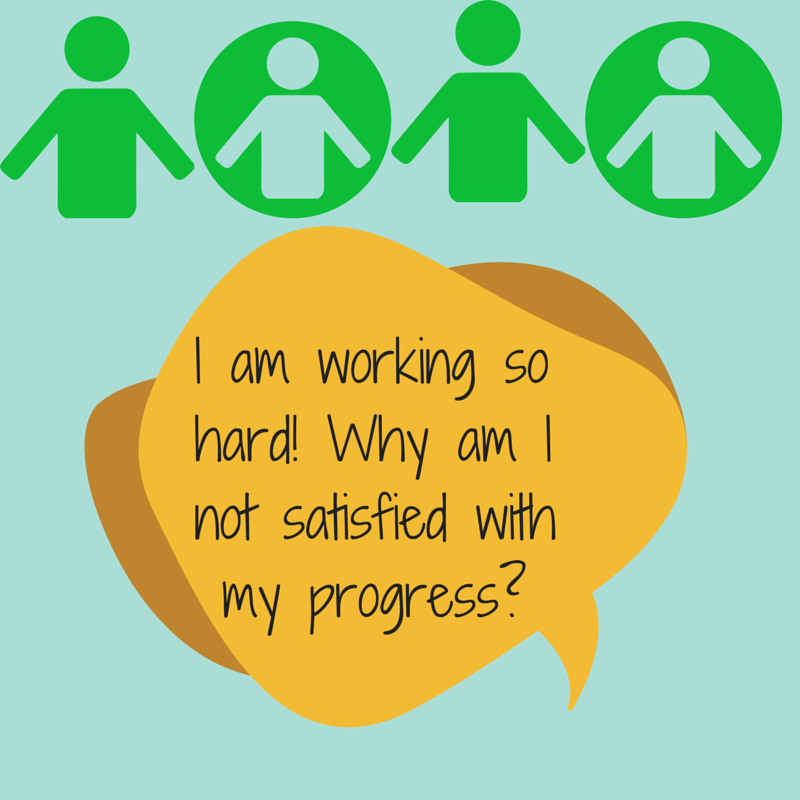
I can tell I am changing. But, I am still not happy with the results.
I feel like nothing is going to work!
If you don’t experience a sensation of success while working towards your goals, regardless of what stage of progress you are in, it is possible that the motivation is not coming from a place of hope. To be able to truly embrace any action leading towards a life change, you must have hope that change is possible and that the action you have chosen will lead you there. Most importantly, you must believe that the change will improve your experience of life. Far too often we do something that we are told will work without any real hope it will actually produce results. For many of us, it is easier to stick with a plan that is not meeting our needs, rather than accept the fact that we need to step back, really assess our need and desires, and then re-chart our course. To achieve the success you desire, you need to engage in a process of rediscovering your drive for progress. This can be scary, but isn’t accepting this need for change, without judgment, far better than continuing to work hard and still feel unsatisfied and dispirited?
I will illustrate the concept of this post through a personal experience I have had with rediscovering my drive.
When I begin to feel discontented, it helps me to take inventory of my state of well-being. For instance, I have at times felt the desire to be physically stronger. I noticed that I felt this desire when I saw other men in the gym lifting more then me, and especially other trainers. I asked myself why I felt this desire for strength. Is it a need for strength based on my day to day interactions? After assessing that this was not the case, it became even more important I get a picture of the root of this desire. If the desire is driven by a need other than strength, then becoming stronger will never satisfy the drive. Is it competition with my peers? Is it a feeling of personal or professional inadequacy due to the greater strength level of other men or my colleagues? I am aware that I will never be the strongest man on earth, nor am I inclined to find a high level of strength to be of great value. So it seems I was more worried about how my level of strength reflects on me as a professional. If this is the case then how would becoming stronger help me professionally?
Questions like these helped me figure out why I want to be stronger, so that I could begin to address it more directly. In my case, I came to realize that while I have colleagues that are stronger than I am, their strength doesn’t necessarily make them better fitness coaches. The fact is that I find I am more than strong enough for my everyday needs, and my clients care less about how strong I am than how well I can help them reach their own goals. I was able to realize that bettering my understanding of how humans function and practicing more effective methods of coaching are going to address my drive for professional adequacy in a way that I value more than being strong.
When there is no hope in satisfying the driving force by pleasing a superficial desire, realizing a better use of our effort can present an opportunity for success.
If I had acted upon my desire for greater strength, it is quite likely that, while I would have become stronger, I would not have achieved that greater feeling of professional adequacy. By digging deeper into the root of my desire, I discovered the driving force was the urge to be a more knowledgeable and effective coach. I realized that there were more appropriate methods of reaching satisfaction than to become physically stronger. This became an opportunity for growth and allowed me to find hope for a future realization of myself. This process of rediscovering my true drive for professional adequacy was crucial in my early years as a coach. It has lead me to an intense development of my understanding of human physiology, psychology, and coaching techniques in the following years. The time spent in education has brought a level of competency and confidence to my professional life I find truly rewarding.
This process is a part of life.
We will all find ourselves at this crossroads at some point on our journey, consciously or unconsciously. It is essential that we face these conflicts in order to cultivate continued growth, especially as we mature into adulthood. I have come to this place many times, and I have striven to remain open to the idea that there is much about my path in life that I do not know. To close myself off to that possibility is to risk missing an opportunity to fine-tune my trajectory in all aspects of life. With respect to my profession as a coach, I am continuously learning and bringing new understanding to my practice, occasionally making gross adjustments that are humbling for me and truly test the foundation of my relationship with my clients. The trick is to make such adjustments with grace and humility, so that the real motivations for change, honesty and desire for progress, are obvious.







